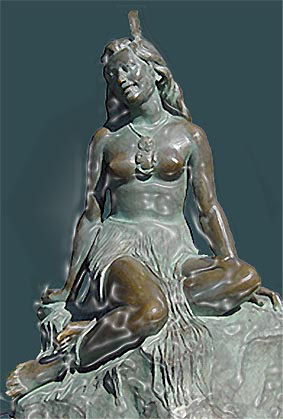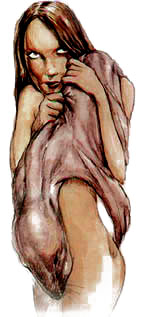| Ko
Pania inaianei he papa kohatu e wha maero pea te tawhiti atu ki
waho o Hukarere. |
Pania
today is a ledge or reef of rock, lying about four miles beyond
Hukarere point. |
|
Nepia - Napier Breakwater - kau mai ai te wahine nei ki uta i
nga ahiahi i te toonga o te ra, a hei te ata po i mua atu o te
putanga mai o te ra ka hoki ano ki tana iwi i te moana. |
The Napier breakwater was the home of Pania, a beautiful sea
maiden who, in ancient times, daily swam shorewards at the
setting of the sun and returned to her sea people before the
break of day. |
| Ko
te wahi nohoanga o Pania i na haerenga mai ki uta ko roto i
tetahi pu harakeke, tipu ai i te taha o te puna wai maori i te
putake o te kari o Hukarere tata atu ana ki te moana. |
While
on shore she hid herself in a clump of flax beside a freshwater
spring at the foot of Hukarere cliff, close by the sea.
|
| I
tetahi ahiahi ka hiainu wai tetahi rangatira e noho pa tata ana
ki reira ka haere ki te puna nei me tana taha ki te inu wai. |
One
evening Karitoki,
a
chief who lived in a nearby Pa, became thirsty, and went for a
drink at the spring. |
I
a ia e inu wai mai ana i tana taha ka kite atu ia i a Pania e
noho mai ana i roto i te pu harakeke.
|
While
drinking from his calabash he spied Pania sitting in the middle
of the flax bush. |
| Ko
tana haerenga atu ka mauria ki tana whare ka moe raua. |
There
and then he took her to his home, and they slept as man and
wife. |
| Otira
i te ata po ka hoki ano a Pania ki tana iwi i te moana, hei te
ahiahi ka hoki mai ano ki uta ki tana tane. |
But
always, every morning, Pania would return to her sea folk and
every evening come back ashore to her husband. |
| Ka
taka te wa ka whanau te tamaiti a Pania he tane, maheni tonu
kahore he huruhuru o te mahunga, tapaia tonutia iho ko Moremore.
|
After
awhile Pania gave birth to a son who was completely without hair
and so was named Moremore, 'the hairless one.' |
| I
tenei wa ka pa te awangawanga ki tana tane kei tiro tana tamaiti
i te iwi o te moana. |
With
the birth of this child, Pania's husband became concerned that
he might lose him to the sea people. |
| Katahi
ka haere ki te Tohunga ki te ui tikanga e mau ai tana tamaiti
raua ko te whaea. |
So
he consulted a tohunga, in the hope of finding how to keep his
child and wife with him always. |
| Ka
mea te Tohunga me tuku a Pania raua ko te tamaiti kia warea te
moe ka uta ai he kai maoka ki runga i a raua, me ta maoa kai,
kia kore ai e hoki ki te moana. |
The
tohunga told him to place cooked food upon the mother and child
while they slept, and they would never again return to the sea. |
| Otira
ana ano te raruraru kaore pea i pai te tamaotanga i nga hoki i
hoki ano a Pania ki tana iwi i te moana oti atu. |
Evidently
something went amiss. Perhaps the food was not properly cooked;
for Pania returned to her people never to return. |
| Ko
te tamaiti i hurihia bei mango, Taniwha, ko ana wahi nohoanga ko
Hukarere - Napier Breakwater -me Rangatira kei te Ngatuawa o
Ahuriri. |
The
child Moremore was turned to a
shark, a taniwha, which lived in the waters around the reef off
Hukarere, and at Rangatira, the entrance to the inner harbour at
the delta of the river called Ahuriri. |
| Ko
Pania inaianei e ai ki to korero a te hunga mahi ika, i na
purata te moana ka kitea tonutia iho e takoto tapapa ana, pango
tonu nga makawe o te mahunga, a ko nga ringaringa matoro mai ana
ki uta. |
When
fishermen of today tell the legend of Pania, they claim that at
ebb-tide she may be seen lying outstretched at the bottom of the
rocky shelf, with her hair still as black as ever and her arms
stretched shoreward. |
| E
ai ki nga korero a o matou pakeke he toka ika inaianei. |
According
to the old people's stories, however, she was turned into a
fishing rock, from which various kinds of fish might be caught.
|
| Kei
roto i te keke maui he rawaru anake nga ika o reira, kei te keke
matau he tamure anake nga ika o reira, kei waenganui i nga kuha
he hapuku anake nga ika o reira. |
Within
the hollow of her left arm-pit only rawaru may be caught, and
from her right arm-pit snapper alone, while her thighs yield
only the hapuka. |
| He
tauranga tapu i te wa i a ratou, na te pakeha kua noa noaiho,
kua kore e rite te nui o te ika ki reira me te wa ia ratou. |
In
the days of old these fishing grounds were sacred, but today,
being frequented by pakehas, the place has become common to all
and fish are no longer plentiful. |


 When
passing the tall bluffs near the break-water, the Bishop
recounted the legend of the Pania Reef. Until that time it was
not generally known. The romantic story greatly appealed to
several members of the Club.
When
passing the tall bluffs near the break-water, the Bishop
recounted the legend of the Pania Reef. Until that time it was
not generally known. The romantic story greatly appealed to
several members of the Club. Shetlanders
say that the seals, or selkies, as they call them, can doff
their coverings at times, and disport themselves as men and
women.
Shetlanders
say that the seals, or selkies, as they call them, can doff
their coverings at times, and disport themselves as men and
women.